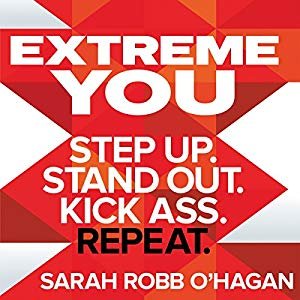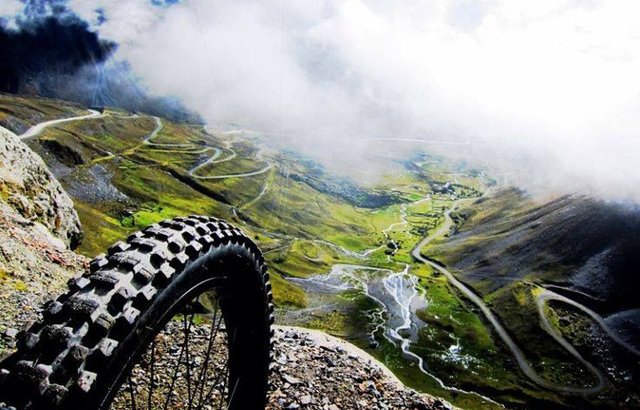How to Turn Pain Become The Magical Medicine for Mental Treatment
Failure gives you something to prove. The hardest part after a crash is getting back up.

In her book, Extreme You: Step Up. Stand Out. Kick Ass. Repeat (Harper Collins, 2017), Flywheel CEO Sarah Robb O'Hagan discusses the importance of bold measures in business success. In this edited excerpt, O'Hagan discusses how to get back on top of your game after failure knocks you down.
The way you beat failure is to live through it enough pushing yourself harder but also drawing on the supportive people around you to realize it won't kill you, which means you can risk failing again. And the more comfortable we are with the possibility of failure, explains Professor Martin A. Schwartz
of the University of Virginia, “the deeper we will wade into the unknown and the more likely we are to make big discoveries.” But there's no course in business school that provides this kind of pain training. You have to experience it, feel it, and survive it.

Failure has not only given me the fuel to overcome my setbacks, it has built up a deep reservoir of resilience in me like an inoculation, a vaccine, against my future fears, so I can take the risks that will keep me true to my ‘extreme self’. Back-to-back firings turned out to be the greatest personal trainer of my life. I've learned that in frightening times I can look around at everyone else and think: You all don't know you're going to be fine. But I do.
Here are some techniques to get you through.
1. Tell the truth and feel the pain
Is it hard to get started on experiencing all that truth and pain and humiliation? Do you find you're haunted by a disappointment but not doing much about it? One of my favorite tricks is to sit down and write out the experience. Journal the whole story, what really happened, until you start to feel it, the real emotion underneath.
Does it really make a difference to write it out? Wouldn't you get the same benefit from thinking about it or maybe just jotting down some lessons for the future? Nope. University of California psychology professor Sonja Lyubomirsky, the author of The How of Happiness: A New Approach to Getting the Life You Want and The Myths of Happiness: What Should Make You Happy, but Doesn't, What Shouldn't Make You Happy, but Does, has been studying the difference that journaling makes. When she and her colleagues asked people to either write, talk, or think privately for fifteen minutes, three days in a row, about the worst thing that had ever happened to them, the writers reported better psychological and--get this!--physical health, and a month later that still held true. The ones who saw the biggest benefit were those who replayed the story in their writing rather than just analyzing it.
In the end, it's not about the failure; it's about how you react. So go ahead, write it out, imagine yourself as a big loser, can you possibly tolerate what it would feel like to be that person? Try on the feeling of giving up the dream. See how angry that makes you. Will you close the curtains and turn off the light, curling up in the fetal position and giving up? Or will you get so fucking angry that you turn your failure into fresh determination and desire?
2. Learn how to crash
Most skiers, like most people in general, try hard not to crash. "Extremers" realize that there are times you need to crash more. The person who helped me to understand that secret is the great American skier Bode Miller. From his point of view, repeatedly crashing and failing on the slopes was what saved him from being just pretty good and trained him to become an Olympic and world champion.
When Bode started out, he told me, skiers were training by taking small, safe steps, improving incrementally and trying not to make mistakes. "They would work on technique and then, once in a while, go one hundred percent and see what happened. Then go back and work on incremental parts again." But for Bode, that approach had two problems.
First, he could already see that someone with his natural gifts would never get to the top by developing the same skills as other skiers and then practicing to minimize his mistakes. As an athlete, he said, "I'm not particularly gifted. I can't run very fast or jump very high. There are people my size who can tomahawk dunk a basketball. I could dunk a tennis ball. Maybe." He concluded that, even doing the maximum possible training as prescribed by sports science, he wouldn't stand out. "If I could make no errors, I would come in thirty-fifth every time. There was no reason to do that." Bode couldn't become a champion by doing what others did; he needed to develop 'Extreme Bode'
Second, he recognized that working on small bits of technique, one at a time, was not in his nature. "The best outcomes for me came when I performed at my maximum, got comfortable there, and made my skill set catch up." Instead of practicing individual aspects of technique, he practiced racing to win: skiing as fast as he possibly could as much as he could. That turned out to give him an advantage in a race. "Other guys trained at seventy percent of their maximum speed. In serious competitions, they would go a hundred percent, and they wouldn't know how to do the simple things they should have learned years ago because they hadn't crashed enough to figure it out. Then they would blow out their knees."

Bode realized that he needed to crash more. He needed to fail more so he could learn what failure could teach him, and he was the right student for that teacher. "I was a durable little kid, big-boned, small muscles, flexible, stretchy, and comfortable on a trampoline. I could do flips and twists. And because I played every sport, I had a general athleticism." He learned how skiers get injured and how to avoid injuries even when he crashed. "So crashing was not my main concern. I mean, crashing into trees was bad obviously you've got to pay attention to your spill zone but I learned that if you are in a certain position in a certain point in a turn, there are things you can do that help. And because I had more crashes than anyone else, because I was constantly putting myself in these extreme situations in training, I developed a skill set to manage those crashes." Failure was teaching Bode how to ski "extreme" with minimal consequences. Instead of letting painful crashes scare him into skiing slower, he let it train him to do just the opposite: to grow more confident and capable of skiing faster, not less but more willing to take the big risks. To make the most of your "extreme" gifts, you must fail, and fail well, and then, by failing, fail less.
So I know what you're thinking: How do I show up to the office and tell my boss that I am planning to fail tomorrow? And fail at what? Well, you don't have to start by putting the entire prospects of your company on the line. Why not start with something in your personal life? Maybe you're into mountain biking but you always choose to take the easy route instead of the hard one. Go ahead go hard for one day, and see what happens. Maybe you'll fall, maybe it will even hurt but in the process you'll be pushing your skills, strength, and confidence to a whole new level. Or maybe you're preparing for the pitch presentation of your life and you're scared shitless because public speaking isn't your thing. Instead of playing it safe and planning to use a teleprompter, why not invite some friends over and go big pitch to them as though your life depended on it, with no notes or visual aids, and see what happens when you crash and screw up embarrassingly in front of them. You'll live, you'll learn, and by the time of the big day, you'll be ready to deliver your presentation with more belief and confidence than anyone else in the room.
Hi! I am a robot. I just upvoted you! I found similar content that readers might be interested in:
https://www.inc.com/sarah-robb-ohagan/how-to-use-failure-to-become-your-most-extreme-self.html